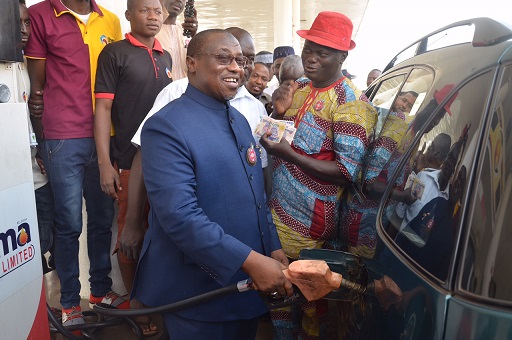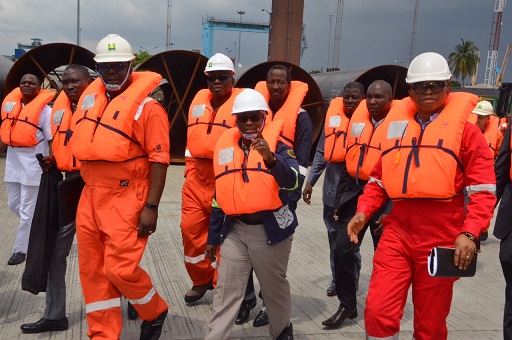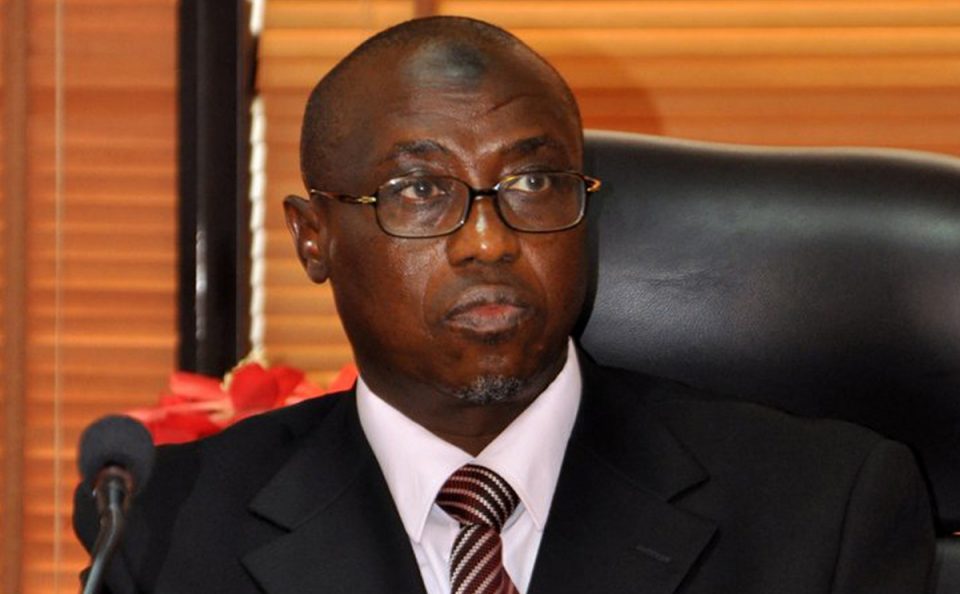Baru’s Glorious Exit From NNPC
By Olamilekan FAWAS

The Group Managing Director Of the Nigerian National Petroleum Corporation ( NNPC) , Dr Maikanti Baru is saying good bye to NNPC after reaching his statutory retirement age of 60 years. Tomorrow 7 July 2019 NNPC Management will be holding statutory retirement reception for him.

Baru’s Valedictory Visit
In his valedictory message Dr Baru said :
“. Now, it is my intention to acquaint you with an overview of the milestones which the NNPC has recorded in about the last three-and-half years with me in the saddle.
Precisely on 8th September, 2017, shortly after my assumption of office, I presented a 12 Business Focus Areas (BUFAs) on which direction I had looked forward to institutionalizing efficiency, profitability and growth in the corporation. The 12 BUFAs are: Ensuring security of NNPC assets, Developing new business models, Settling Joint Venture Cash Call Arrears, Boosting production and reserve growth, Growing Nigerian Petroleum Development (NPDC) crude oil production, Gas development, Developing renewable energy, Focusing on frontier exploration, Undertaking oil and gas infrastructure development, Developing new ventures, common services, professionalism and accountability and Staff welfare.
“Years on, I am delighted to report that we have got a harvest of desirable outcomes of our efforts. We have groundbreaking stewardship report on each of the 12 Business Focus Areas.
Let me start with the upstream sector. During the period under review, the Nigeria’s crude oil average daily production recorded an upward swing of about 2.06million barrels in 2018, translating to a 10.75 per cent increment, compared with the 2017 average daily production of 1.86million barrels. Pitched against the low-level average daily crude oil production of 1.2million barrels in 2016, Nigeria has maintained a line of consistent year-on-year improvement. I make bold to say that the crude oil production increment was facilitated through the new business models we emplaced in NNPC’s old and new business entitles. Among the reengineered entities of the corporation that have made the difference are: the Nigerian Petroleum Development Company (NPDC), Nigerian Gas Company (NGC), Petroleum Products Marketing Company (PPMC), Duke Oil, NIDAS and Integrated Data Services Limited (IDSL).
” Indeed, NPDC , NNPC’s Upstream flagship company, was a major contributor to the Industry’s success story in 2018, declaring 52 per cent daily crude oil production growth in 2018 compared with the company’s 2017 performance.
”
NPDC’s average production from the company’s operated assets alone grew from an average of 108,000 barrels of oil per day (bod) in 2017 to 165,000bod in 2018, a feat regarded as the strongest production growth within the Oil Industry in recent times.
” The NPDC’s equity production share closed at over 207,000bod, representing about 10 per cent of national daily production, was no less impressive. The company’s last average weekly production of 332,000 barrels per day makes the target of 500,000bopd for 2023 achievable. It is instructive to note that NPDC is now the largest supplier of gas to the domestic mark, delivering over 700mmscfd of gas to the Escravos-Lagos Pipeline System. These desired results were outcomes of initiatives emplaced by the Management team under my purview. These initiatives include Asset Management Tea (AMT) structure, Strategic Financing, Units Autonomy and security architecture framework.
” Another giant achievement the Industry recorded in recent times was the 200,000bop crude oil addition by the Egina Floating Production Storage and Offloading (FPSO) which was completed and sailed away to location in August last 2018. The project achieved First Oil at 11.20pm on 29th December, 2018.
“NNPC Management under my purview saved $1.7billion dollars from renegotiating Cash Call Areas of $6.8billion to $5.1billion with the corporation’s Joint Venture (JV) partners. The balance is scheduled for repayment over a five-year tenor plan. Already, the corporation has defrayed $1.5billion of the arrears. NNPC would stick to the Repayment Agreement with the JV Partners as it transitions to self-funding IJV modes with the corporation’s partners, as tiding up the Cash Call issues has led to increased commitment and enthusiasm to invest in Nigerian Oil and Gas Industry and has also boosted NNPC’s credit profile internationally
“Other milestones achieved by NNPC in the Upstream Sector include: reduction in contracting cycle for Upstream Operations to nine months from an average of 24 months, with the corporation targeting a six months cycle; lowering of production cost, from $27/barrel to $22/barrel; and improving on the security situation in the Niger Delta through constructive engagement and dialogue with relevant stakeholders.
Of importance is the renewed focus on frontier basins, leading to spud-in of Kolmani River-II Well on 2nd February this year. Drilling on the Well is nearing 10,000feet mark, even as the NNPC Frontier Exploration Services, the Division that superintends the inland basins exploration has been recently moved to the Upstream Division of the corporation in order to afford it more visibility and empowerment to execute it’s mandate. Activities are expected to resume in the Chad Basin as soon as there is green light on the security situation in the enclave.
“In the Midstream, Nigeria achieved an average national daily gas production of 7.90bscf in 2018, translating to 3 per cent above the 2017 average daily gas production of 7.67bscf. Of the 7.90bscf volume of gas produced in 2018, an average of 3.32bscfd (42%) was supplied to the Export market, 2.5bscfd (32%) for Reinjection/Fuel Gas, 1.3bscfd (16%) was supplied to the domestic market and about 783mmscfd (10%) was flared.
“Domestic gas supply capacity was marginally stable at about 1700mmscfd with an average of 1.3bscfd supplied to the domestic market, due to power evacuation challenges caused by frequency Management as a result of reinjection of allocated load by Distribution Companies (DISCOs), as well as transmission line constraints.
“Out of the 1.3bscfd supplied to the domestic market, an average of 71mmscfd went to the Power Sector, while 470mmscfd was supplied to the Industries and the balance of 69mmscf delivered to the West African Market through the West African Gas Pipeline (WAGP).
” NNPC is expected to bridge the medium-term domestic gas supply deficit by 2020 through the corporation’s Seven Critical Gas Development Projects (&CGDPS), as a reputable Project Management consulting firm is already collaborating with an NNPC team to achieve accelerated implementation of the projects.
“The full implementation of the project would boost domestic gas supply from about 1.5bscf/d to 5bscf/d by 2020, with a corresponding 500 per cent increase in power generation and stimulation of gas-based industrialization.
“I am delighted to inform you that existing power plants in the country now have a permanent gas supply pipeline infrastructure, even as NNPC is poised to continue to expand and integrate its gas pipeline network system to meet increasing domestic gas demand.
” Key gas pipeline infrastructure projects on which significant progress had been made in their execution include: Escravos-Lagos Pipeline System (ELPS II), Obiafu/Obrikom-Oben (OB3), Odidi-Warri Expansion Pipeline (OWEP), Trans Nigeria Pipeline Project (TNGP) – Ajaokuta-Kaduan-Kano (AKK) Pipeline, Trans Nigeria Pipeline Project (TNGP) and Nigeria-Morocco Gas Pipeline (NGMP) Project.
“In the Midstream Refinery Sub-sector, NNPC is committed to the rehabilitation the nation’s three refineries in Port Harcourt, Kaduna and Warri, to boost their capacity utilization. In March, the first phase of the rehabilitation of the 210,000 barrels per day capacity Port Harcourt Refinery complex that comprises the 60,000 barrels per day old Refinery built in 1965 and the 150,000 barrels per day, new Refinery, was kick-started.
“The project is being executed by Milan-based Maire Tecnimont S.p.A, in collaboration with its Nigerian affiliate, Tecnimont Nigeria.
At the end of the phase 1, the Refinery complex should to reach 60 per cent capacity utilization.
This first phase of the rehabilitation contract which would run for six months would involve detailed integrity check and equipment inspection of the Port Harcourt Refinery complex beginning from end of March, 2019.
“The integrity test comes as a forerunner to the second phase of the rehabilitation project which entails a comprehensive revamp of the complex aimed at restoring the refinery to a minimum of 90 per cent capacity utilization.
“Subject to the successful completion of the integrity checks, Phase 2 of the project would be executed on an Engineering Procurement Construction basis by Tecnimont in collaboration with the original builders of the plant, JGC of Japan. The rehabilitation of the other two refineries in Kaduna and Warri is expected to follow.
In the Downstream Sector, though the early part of 2018 was riddled with some supply shortages, the corporation rose to the occasion with the support of President Muhammadu Buhari and the resilience and hard work of NNPC staff to keep the country wet soon after till date.
” So far, many the corporation’s depots had been resuscitated and put into use through decanting of over 140 Million litres of PMS nationwide, with systems 2B and 2E pipelines supplying petroleum products to South West, South-South and South East Regions having been resuscitated.
. “I wish to inform you that NNPC is on track in respect of the corporation’s Twelve (12) key Business Focus Areas (BUFA), and the vision of President Buhari to improving the status of oil and gas infrastructure through ensuring products availability to support national economic recovery and growth.
“We continue to plan for a better performance and achievement in 2019, especially with the continuous innovations and creativity in the downstream sector and the performance bond signed by all the relevant heads of the corporation’s operating units recently. Continuous improvement, a major plank of a World Class organization, would remain NNPC’s key word in 2019, I assure you that our 2019 performance would dwarf the 2018’s.
“In a nutshell, the focus areas include: Developing strategies to ensure security of Industry assets; Evolving new Business Models to bolster performance; Exploring ways to relieve government of the burden of Cash Calls obligation; Growing the nation’s reserves and production; Increasing the Nigerian Petroleum Development Company’s (NPDC) production; Boosting Gas Development, Effecting Refineries upgrade and expansion, Boosting renewable energy; Prioritizing Frontier Exploration, Revitalizing Oil and Gas infrastructures across the Country, Intensifying the drive towards making venture businesses of NNPC profitable and ensure service delivery; as well as ensuring staff welfare.”




